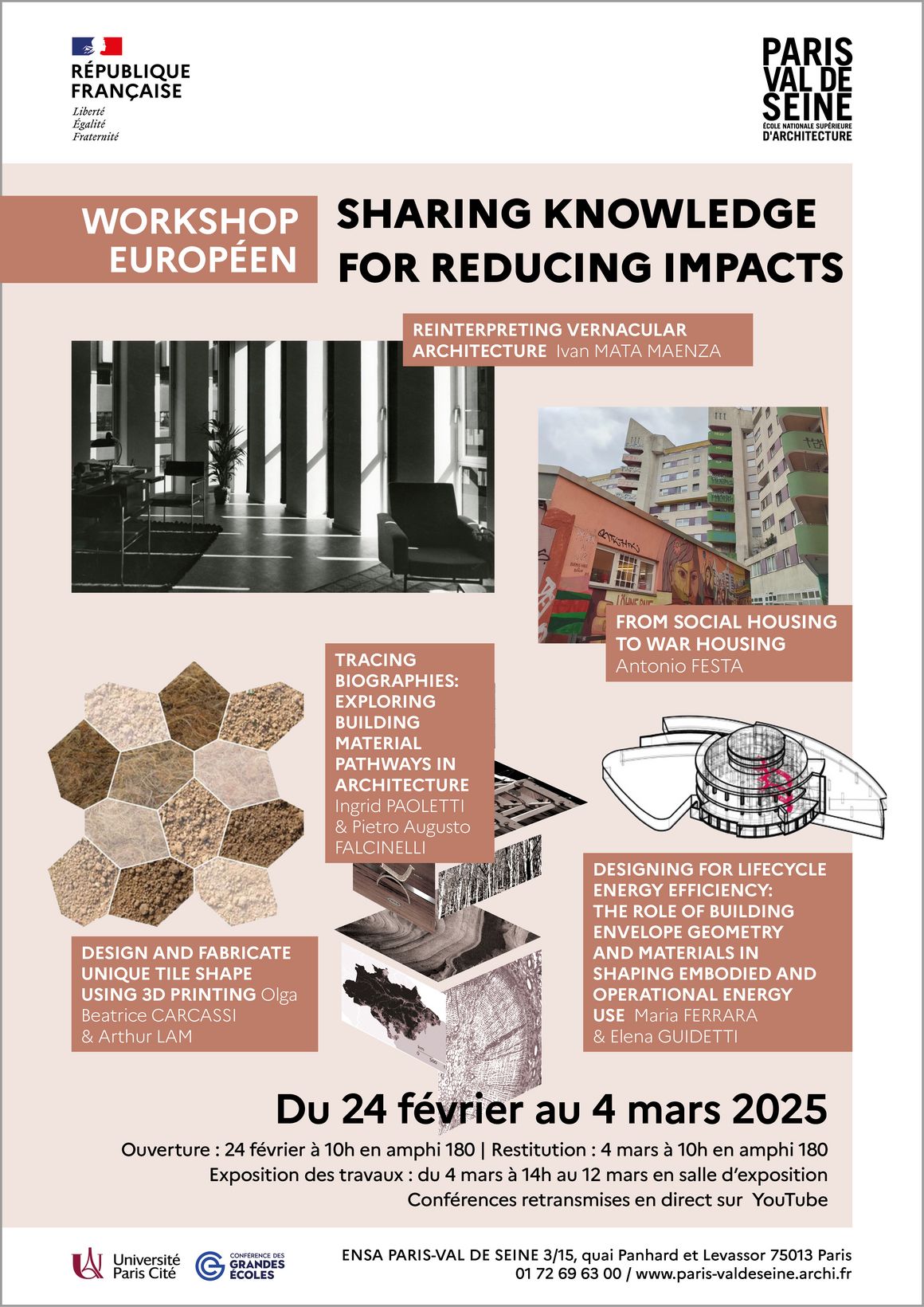WORKSHOP EUROPÉEN 2025 : "Sharing knowledge for reducing impacts"
• Ouverture le 24 février 2024 à 10h en amphi 180
• Restitution le 4 mars à 10h en amphi 180
• Exposition ouverture le 4 mars à 14h en salle d'exposition
“Habitat écologique : matériaux et démarches à l’échelle internationale”
L’édition 2025 se tient du lundi 24 février au mardi 4 mars inclus.
Le workshop européen est organisé pour les étudiants du semestre 8 en M1. Il est animé par des enseignants architectes invités de toute l’Europe, autour d’une problématique commune à l’ensemble. Il se conclut par des présentations des travaux.
Le workshop européen 2025 a pour titre “Sharing knowledge for reducing impacts” et sera coordonné par Francesca Contrada et Emma Filipponi.
La transition écologique et la lutte contre le dérèglement climatique engendrent une transformation profonde des pratiques architecturales. Des nouvelles filières, des approches plus globales et des techniques d’analyse innovantes se mettent en place pour faire face à ces défis.
Le workshop s’inscrit à l’échelle internationale où les architectes et les chercheurs partagent leurs expertises nationales et régionales. Cet atelier permettra un échange direct entre les étudiants de l’ENSA Paris Val-de-Seine et les architectes et les chercheurs d’Italie, d’Espagne, d’Allemagne et des États-Unis, afin de comparer les solutions et des problématiques spécifiques caractérisant la conception de bâtiments écologiques et durables.
Le workshop européen est un moment privilégié dans le cycle master, il répond à plusieurs objectifs pédagogiques :
- Accueillir au sein de l’École des pédagogies et des approches différentes ou complémentaires de celles qui sont proposées par l'ENSA Paris-Val de Seine
- Produire dans un temps réduit un exercice et une réflexion collective autour d’une question d’architecture ou d'urbanisme.
L’objectif principal du workshop 2025 est de raisonner avec les étudiants autour d’un thème fédérateur, afin de se sensibiliser aux démarches internationales, en valorisant les différentes approches en matière de construction écologique.
Le concept d’architecture écologique est strictement lié au respect de l’environnement mais cela nécessite d’une vision holistique et multi échelle.
Cinq ateliers différents sont proposés afin d’explorer ce concept sous angles différents avec le but de pouvoir partager l’ensemble des connaissances acquises lors de la dernière journée de workshop.
Du choix du matériau, à l’analyse des composants, à la transformation de l’existant dans un contexte de crise climatique et politique, les 5 ateliers permettent de comprendre les diverses facettes de la définition d’architecture écologique et la nécessite de dialogue entre les diverses échelles.
LES INVITÉS CETTE ANNÉE SONT :
- Ivan Mata Maenza - Architect - Vaivera Arquitectura (Spain)
- Antonio Festa - Architect - RTW Generalplanungsgesellschaft mbH (Germany)
- Ingrid Paoletti- PhD Full Professor - Politecnico di Milano (Italy)
Pietro Augusto Falcinelli - PhD student - Politecnico di Milano (Italy) - Olga Beatrice Carcassi- PhD, Associate Research Scientist - Natural Materials of Columbia Gsapp - University (USA)
Arthur Lam - Engineer, PhD - Université Paris Est (France) - Maria Ferrara - PhD, Assistant Professor - Politecnico di Torino (Italy)
Elena Guidetti- PhD, Assistant Professor - Politecnico di Torino (Italy)
étudiants moniteurs
Mathys Adelakoun
Amirale Gomis
Claude Enaura Anoula
Candice Courthial
Alice Habran
Tom Martin-Volcovici
Maëlys Oui
Mathias Petrou
Jakob Podversic
Ornella Trantoul
PROGRAMME DES CONFÉRENCES
À suivre en direct sur notre chaîne YouTube
Mardi 25 février | amphi 180 : “CONTEXTES”
- 12h à 13h : Ivan Mata Maenza, Vaivera Arquitectura : “Un parcours vers une architecture”
- 14h à 15h : Antonio FESTA, RTW Generalplanungsgesellschaft mbH : “Affordable housing in berlin - a brief retrospective and the present situation”
Mercredi 26 février | amphi 180 : “MATIÈRES”
- 12h à 13h : Olga Beatrice Carcassi, Columbia University – Natural Materials Lab : “Designing for regenerative cultures”
- 14h à 15h : Pietro Augusto Falcinelli, Ingrid Paoletti, Politecnico di Milano : “Expression and impression of matter”
Jeudi 27 février | amphi 180 : “EXPÉRIENCES”
- 12h à 13h : Maria Ferrera, Politecnico di Torino : “Cities towards climate neutrality: digital twins and design approaches for decarbonizing the urban built environment”
- Elena Guidetti, Politecnico di Torino : “Designing the future of the past. research paths and interdisciplinary approaches for adaptive reuse”
- 14h à 15h : Arthur Lam, Université Paris-Est : “La construction durable au service de l’architecture solidaire”
Mardi 4 mars | amphi 180
- 14h : Agostino De Rosa, PhD Full Professor - Università Iuav di Venezia (Italy) : “Sparkling of Knowledge. The Roden Crater Project by James Turrell”
Présentation des enseignants invités
Ivan Mata Maenza
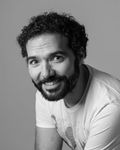
IvanMata Maenza obtained the Master's degree in Architecture from ETSAB (Technical School of Architecture of Barcelona) in 2005. After collaborating with local agencies in Barcelona, his career became more international starting in 2004. Following an Erasmus year at Paris-La Villette (2003), he worked for several years with Ateliers Jean Nouvel.
Between 2008 and 2009, he lived in Rotterdam and joined OMA. He then settled permanently in Paris in 2009, working on projects in cities like Bamako, Bordeaux, and Copenhagen, both independently and in collaboration with renowned agencies such as AJN, OMA, the Danish agency BIG, and the Paris-based FREAKS.
In 2020 he obtained a specialized university diploma in eco-responsible construction from the Gustave Eiffel University. In 2023, he co-founded Estudi Vaivera with Fina Urpí in Barcelona to develop architecture that responds to contemporary environmental and societal challenges.
Ivan has worked on significant cultural projects, such as La Méca in Bordeaux, the refurbishment of the Strasbourg Zoological Museum, and the French Institute in Barcelona. His interest in housing and bioclimatic solutions is currently reflected in a cooperative housing project in Vilafranca del Penedès, focusing on optimizing wooden structures and bioclimatic atriums.
In addition to his professional work, Ivan has collaborated with Roma-La Sapienza University (Italy) for summer workshops and contributed as an expert nominator for the Mies van der Rohe Foundation in Barcelona. He also taught architectural design courses at ENSA Paris-Val de Seine between 2022 and 2024.
Antonio Festa
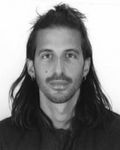
Antonio Festa is an italian architect living in Berlin, working on social housing, school construction and temporary architecture for art events. He believes that architecture can be used as a transformational instrument for social change. A change that is possible through the development of an inclusive and sustainable planning process, based on the needs of the people who will live in those spaces.
During his master Engineering and Achitecture at the 'Università della Calabria', he received an Erasmus-Socrates scholarship and studied at 'Universidade Moderna de Lisboa' in Portugal.
In 2011, he completed an eight-month internship at the studio 'Cecchetto & Associati' in Venice. He graduated from the University program in May 2012 with a score of 110 with honors and in September he received the authorization to practice the profession of Architect. The same year he started working as freelancer and moved to Berlin.
In January 2014 he started a year and a half collaboration with the office 'Annabau', participating in architectural and landscape projects and competitions. In February of the following year, he began working with the studio 'Thoma Architekten'. Over a period of almost seven years, he gained practical experience in all project phases, first as a project manager and later as a construction manager, working mostly on social housing and school projects.
In the spring of 2024, he joined the Architects' Chamber of Berlin and am currently working as Lead Architect in Building Design at 'RTW Generalplanung'.
Olga Beatrice Carcassi & Arthur Lam
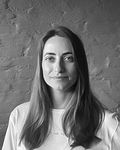
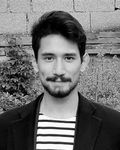
Olga Beatrice Carcassi is an Associate Research Scientist at the Natural Materials of Columbia GSAPP University. Passionate about regenerative and low-carbon technologies, Olga’s work catalyzes the field of 3D printed natural materials and architectural artifacts, from both a building science research and digital manufacturing perspective.
She also specializes in new fabrication and LCA methodologies of mycelium-based composites to reach climate neutrality for the building and construction sector. Previously,
Olga was a Postdoctoral Researcher at the ABC Department of Politecnico di Milano, where she also received her Ph.D. Olga’s work has been published in Environmental Science & Technology and Automation in Construction journals, and she contributed to the design of different installations within architectural exhibitions to disseminate her scientific results, such as the “Unknown Unknowns- 23rd International Exhibition” at Triennale di Milano, and "NDIDI” at the upcoming Mexico Design Week 2024.
Arthur Lam Arthur LAM holds an engineering degree from ESTP Paris and a PhD (2024) in geomaterials from the University of Paris Est.
He is a sustainable construction engineer, vice-president of Archi Solidaire: design and project management, he is responsible of training and supervision of architecture students and works and consultant in sustainable and geo-sourced construction
Ingrid Maria Paoletti & Pietro Augusto Falcinelli
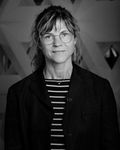
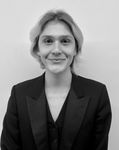
Ingrid Maria Paoletti is full Professor of Architectural Technology at the Politecnico di Milano, where she focuses on innovative technologies and material culture in architecture. Her research integrates design with cutting-edge advancements in construction and sustainability, with a strong emphasis on emerging design.
She leads the Research Group Material Balance. Paoletti has contributed to numerous projects that explore the relationship between architecture and technology, often working at the intersection of academia and industry. She is also a prolific author, sharing her expertise in various publications, and is involved in initiatives that promote awareness in architectural practice.
Pietro Augusto Falcinelli is a PhD Student at the Material Balance Research Group of the Politecnico di Milano. He has an academic background in Architecture, with a curriculum focused on research and innovation in construction materials.
His current research, "Material Exploration through Innovative Digital Screening for Inclusive Architecture towards Societal Well-Being," aims to investigate using X-rays and imaging techniques in the built environment. By creating an interconnected digital model, it will be possible to gather essential information to diagnose and prevent risks associated with construction materials.
Maria Ferrara & Elena Guidetti


Licensed architect and Ph.D. in Energetics, Maria Ferrara is Assistant Professor and member of the Academic Senate at the Polytechnic University of Turin, where she conducts research and teaching in building physics and energy systems. She has been qualified for the position of Associate Professor since 2021. She is co-director of the Energy Security and Transition Lab@Energy Center and member of the Future Urban Legacy Lab.
Her academic experience includes research at INSA-Lyon (France, 2014) and Princeton University (USA, 2016-2017), deepening her expertise in energy systems and sustainable building design. She collaborates with the International Energy Agency and the European Commission and leads projects leveraging Building Simulation, Earth Observation, and AI to optimize high-performance buildings and energy systems. She coordinates multidisciplinary projects on technological and social innovation, supporting policy-making for sustainable cities.
Since 2022, she has been a Board Member of IBPSA-Italy. Recognized for academic excellence, she received the Ermenegildo Zegna Founders' Scholarship and Siebel Scholar in Energy Science as international distinction. With over 60 publications, she serves on the editorial board of leading international journals in her fields.
Beyond academia, she advises Architecture and Engineering firms on sustainable building design and performance simulation.
Elena Guidetti is an architect and PhD, currently serving as Assistant Professor at the Department of Architecture and Design at Politecnico di Torino. She is also a member of the Future Urban Legacy Lab research center.
In 2022, she earned her PhD in "Architecture. History and Project" from Politecnico di Torino, focusing on the transformative potential of existing buildings in post-functional Europe. Her research explores adaptive reuse through a morphological perspective, analyzing stages of completeness and embodied energy to develop sustainable strategies for urban and architectural adaptation. Her expertise lies in urban and architectural design strategies, employing research-by-design methodologies to uncover innovative approaches for repurposing built legacies. She adopts an interdisciplinary perspective, integrating preservation theory, design, and sustainability studies to address contemporary urban challenges.
Since 2018, she has collaborated with Politecnico di Torino, Faculdade de Arquitectura do Porto, and the universities of Ferrara, Hasselt, Sarajevo, Dessau, and Polis Tirana on various academic and research initiatives. Elena is also an editor at Ardeth Journal and ProArc Intersezioni Journal, contributing to the discourse on architecture and design.


